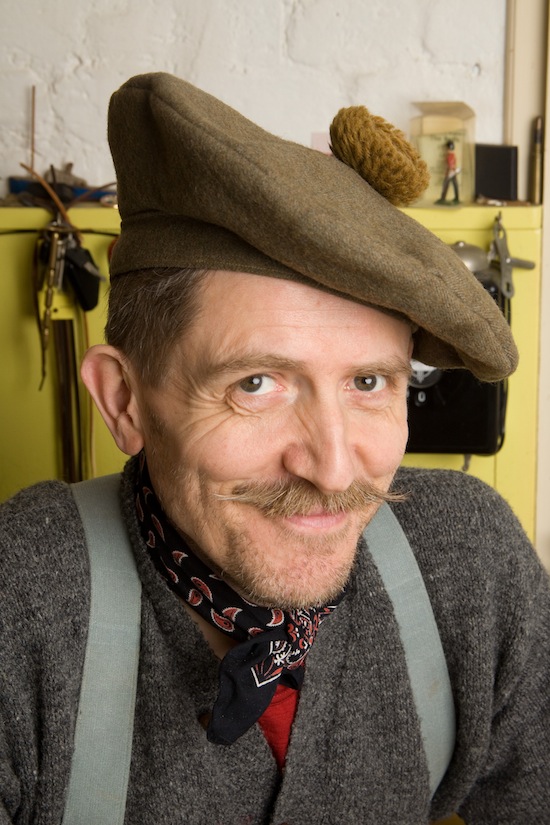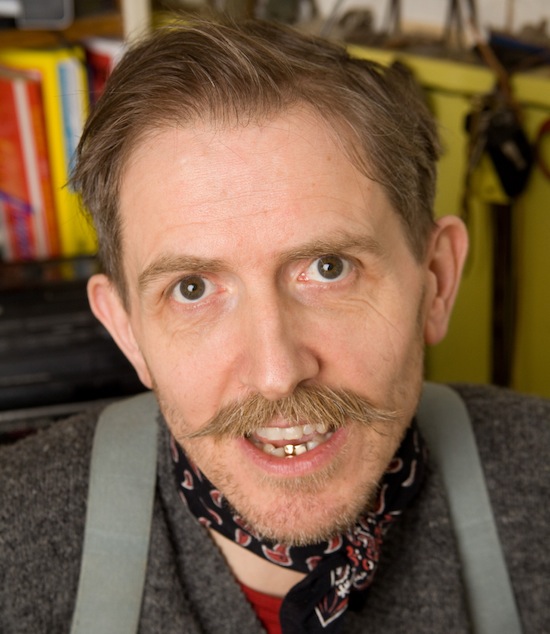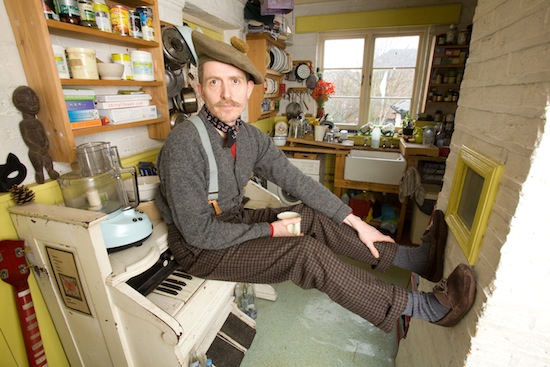Photographs courtesy of Edd Westmacott
In 2011, Billy Childish was invited to the ICA to do a filmed 45 interview with the artist and writer Neal Brown. As a way of introducing Billy, Neal listed all the work – art, music, writing, film – that Billy had done since he’d had an exhibition of paintings at the ICA the year previous. The list took a full seven minutes to cover.
Ahead of celebrating Billy today on tQ with the below interview, a Baker’s Dozen and Things I Have Learned, we asked him to send a list of things he’s doing this year. It read:
I have a novel, All The Poisons In The Mud, coming out, based in 1976-1978.
A film project, The Goal Of The Motorway Bridge, which is short monologue extract from one of the earlier novels.
An exhibition of new paintings.
An exhibition of paintings relating to the Boer War (and I’m publishing a book of photos of the same by my pal’s great grandfather).
An Art Hate exhibition in London, and a projected one in Moscow (in relation to Russian Futurism).
A projected exhibition of collaborative paintings made with my friend Edgeworth.
A new CTMF LP.
A few limited CTMF 45s.
Plans to record an LP with the girls, The Shall I Say Quois.
A secret novella project.
Record with The Spartan Dreggs.
There’s probably more but that gives an overview.
Business as usual, then, and to fill in a few gaps here, The Spartan Dreggs, which features The Fire Department’s Neil Palmer, and CTMF are Billy’s two most recent bands, and The Shall I Say Quois features Billy’s wife Julie and members of The Headcoatees.
Famously, Billy once said, "I am not a painter, I am not a musician, and what sort of idiot would want to be a poet?" but in recent times, he’s become particularly known for his paintings. Buoyed by the 2010 ICA show and a concurrent exhibition that took place at White Columns in New York, his stock as an artist has risen considerably, leading to commercial success. At his home in Rochester, Kent, we talked about his new-found position in the art world, his on-going Art Hate campaign and his views on digital culture.
You join us at the end of a discussion about the values of musicianship, or lack thereof ("What’s musicianship ever done for anybody?"), and conservatism in music.
In a very general sense, would it be fair to say that your music has always been primarily driven by a desire to be anti-conservative?
Billy Childish: No, it’s never reactionary, although there can be benefits to being reactionary; it’s about what sounds good. Almost everything I’ve done in music, no matter how good or bad it is – and in painting and writing – has been done for artistic reasons. It’s been done for itself, and never for an audience. That to me is the mark of value, because even if it’s crap at least it has integrity.
What happens when, as is currently happening with your paintings, you suddenly find a much bigger audience?
BC: I’ve always had an audience, but not always commercial success.
How do you explain that suddenly happening? What was the turning point?
BC: It’s because I’ve stuck with what I’ve done for all the years and some of the people who were nobodies 30 years ago, but liked me, have come into positions of influence and they consider that my work has moved on. It’s happenstance; a wave washed towards the shore and my bit of driftwood was on it. Other people think there’s been planning and these things happen by genius and cunning, but I don’t do any of those things. I don’t like being chucked up on a wave and nobody’s asked me to redesign my driftwood; I’ve just stuck with what I’ve always done.
But everything goes back. One of my first exhibitions was with my pal Peter Doig, the famous painter. He was at Saint Martin’s with me the second time I went there. We both liked rock & roll music and figurative painting, so he was my only friend in the place. Pete did a show of mine in the early-nineties in London, before he became well-known, and he had a friend who wanted to co-curate, Matthew Higgs. He’s since become a rated curator and is now the director of White Columns in New York. People always said he was stupid for wanting to do a show with me, but he did one in 2010. Then the ICA found out and I said they could do one concurrently, which they did. During the ICA show, a fella from Germany came over. When he was about 20, he’d interviewed me for a music paper and he was also trying to curate exhibitions. He put me in a group show in Cologne in the early-nineties and he’s since become a big player in Germany. He saw the stuff at the ICA, took it over to Germany and did a sell-out presentation of my work. And then I did a show in Berlin. These people are good guys; they don’t ask me to sign a contract, or change anything, and they contain prices, which is important because I’m interested in longevity. Everything’s done in a gentlemanly way, a bit like how I’ve always worked with record labels.
You’re suggesting all this has happened because of people. Do you not think there has also been a cultural change that has somehow made your work suddenly seem more vital?
BC: I think with the economic downturn, people are looking for something which at least seems like it has integrity, and I at least seem like I have integrity. I might fit in. It’s what attracts people to me – in music, too. But in music, there are certain ego issues and if you’re a bit lumpy, it can lead to things not working out. I think the reason why people like Beck, Jack White and Mudhoney liked me is because they admired something in what I do. They think I mean it, and that goes across in the paintings as well.
Article continues after portrait

Would it be fair to say that, although you’ve become an art insider, you never sought to be an outsider?
BC: I’ve never seen myself as an outsider, and I think it’s rude when people have called me that. Why have people called me an outsider? Because I do the thing properly. That’s a minority position, and I don’t mind being a minority. I’m aligned with a tradition of doing things with a respect for what it is. I’m not going to be modest about that.
Nonetheless, you’ve always thrown rocks from the sidelines, often at the establishment. What, for example, is Art Hate, which you came up with in 2009?
BC: In 1976/77, I became aware of Dada and Kurt Schwitters and I saw it as a real parallel to punk rock. I really liked it because I would use it for poking fun at art schools. Britart [the YBAs] did what I call ‘commercial dada’ and I really didn’t like that, but it took me a while to work out a good response. The thing that interests me about Dada is that it’s anti-art, so I came up with a non-organisation called the British Art Resistance and Art Hate. I like the idea of it; I thought it was funny. In a sense, it’s the opposite of making art, and the flaw was that it became aesthetic and artistic with all the posters I made. It was a fine balance. So perhaps the answer is Art Hate is fun on Thursday afternoons at the L-13 Light Industrial Workshop [Billy’s London gallery].
Some posters you did were specifically anti-Damien Hirst. Were they part of Art Hate?
BC: They were slightly separate. Art Hate started becoming jokey and I tried to draw it back from that. We wouldn’t lower Art Hate by doing a political statement against Damien Hirst – that was social commentary.
You also made a series of anti-David Cameron posters, many of which were printed in The Stool Pigeon. Were those part of the same campaign?
BC: Yes. Peter Cook is dead, so someone had to do it. The only other person who might have would have been Stewart Lee and he keeps busy doing other stuff. But I don’t have a problem with David Cameron as a human being. Or rather I might, but I don’t have to live in his proximity. The posters were about people not being what they present, or represent. They’re just who they think they are and maybe I have a problem with that. But mostly I did those posters because they were fun. It’s fun to chuck stones, especially at people who have a pomposity about them, or a surety about their rightness. I think we have a spiritual duty to remind people that they don’t have a destiny to rule.
So they were non-political? One slogan was ‘Big Society? Big Cunt!’ Did you not take issue with the Big Society as a political idea?
BC: My issue is that it’s meaningless. It’s just an empty catchphrase that has no credibility; it’s delusional. I was brought up on beat music, but also Peter and Dud, Monty Python and Morecambe & Wise. Maybe I liked them because they were anarchic, but I wouldn’t have known that at the time. I liked them because they were funny and insightful. That’s what comics should do and can do – take the mick of the king without getting beheaded.
You now have a studio in the Chatham dockyards. How did that come about?
BC: I was invited to do an exhibition in the dockyard, because they opened a gallery. The idea was that I’d paint the pictures in the yard for the exhibition and they’ve got some room there, so they gave me a studio and I became Artist In Residence while I was working on the exhibition. I pay for the space and make my big paintings there. I work at under 6′ at my mum’s on a Sunday, as I’ve always done, and up to 10′ on Mondays at the dockyard. So two days a week now – nearly full-time!
Has getting this studio and doing the exhibition got anything to do with your reputation as a local artist, regardless of your stature elsewhere?
BC: The fact that I got an exhibition suggests that, but only slightly. Having a reputation around here has its upsides and downsides. One of the upsides is that I get people saying, ‘Nice moustache, mate.’ The downside is that people shout abuse because I have a moustache. What I mean by that is that I’ve become more visible and some people are happy about that; others aren’t. It’s even-stevens, and these things can unravel. One thing leads to another, you’re not in charge of it and you cannot make it into a recipe. I call it ‘jam’ – you get jammy. Of course I work really hard, and the weirdest thing is that I’ve never been jammy in music. But I got jammy in art, which is my favourite thing anyway – painting – so that’s double jammy. I could have easily been jammy in music, or writing, and I may still be.
Nonetheless, people around here must be proud of you…
BC: I’m sure you could find some people who are, but luckily most people don’t know who I am, which I like. I’m more likely to get recognised in London than I am in Chatham, and often when I’m recognised in London it isn’t me – it’s someone who looks like me. I’m not sure if that’s an advantage or not. I apparently attend things and go to places that I would never attend or go to. I’m a bit like Moby dick – sighted simultaneously in several oceans at once.
It’s just a fashion thing, isn’t it? Hipsters have stolen your look, but they’ll move on.
BC: It’s people who have got too much time on their hands. Actually, my theory is that some people think if they grow a moustache, others might mistake them for interesting. Perhaps I’ll grow a beard and people will assume I’m a man of substance. Might work. But I’m just someone who does things and happens to have a moustache.

I want to ask you about your views on digital culture and some things you’ve done that seem in response to it. For example, in 2012, The Spartan Dreggs released three albums, but to get the third you needed to collect tokens from the previous two. In a sense, the third album was unavailable. Were you making a statement about how digital culture makes music constantly available?
BC: I have mixed feelings about this. I think things, in general, should be available and preserved, but I also think that things like battery farming make it Christmas every day. If you have a chicken every Sunday and not once a month, it doesn’t taste as much and probably isn’t of such good quality. And that’s a shame. More of something is often less of something.
But online, it’s irreversible. We can’t go back.
BC: Yes, and that’s the same as the dockyard closing around here. It doesn’t mean we’re not able to discuss it or do fun things. Last year, we [CTMF] did a double coloured 10" with a handmade gatefold sleeve on a German label for no reason other than it might be interesting to somebody. It certainly wasn’t going to make any money. Same with The Spartan Dreggs albums and the last CTMF album. There’s something about that record that no one knows about and that makes it interesting to have. I like doing things like that – it makes them intriguing and not just available. And it’s not a statement against anything, it’s just a statement of intent.
It’s been quite a while since you’ve played live. Why is that?
BC: I’ve got no problems playing live but conditions need to be met, and those include playing in a sit-down theatre, no mobile phones, using the right gear and things like that. We get asked to do festivals a lot and that just isn’t going to work for us.
Is there also a sense that your art has taken off and you don’t need to play gigs to make a crust these days?
BC: I’m pretty happy to not have to go out and do gigs the whole time, yes, because the only thing I like about gigs is playing on stage. The bit around it, I don’t find interesting. I don’t like the venues much, I don’t like the security, I don’t like the security barriers and I don’t like the PAs in venues. And I don’t like it when people watch us from a tourisitc point of view, as they’ve sometimes done in the past. It also has something to do with Scout [Billy and Julie’s four-year-old daughter] coming along – we didn’t want to take her to the venues – and I like playing with Julie in the band.
All in all, it seems like you’re in an amazing place at the moment.
BC: It’s good.
Scout: Apart from when people throw litter.
BC: Apart from when people throw litter, it’s good.
Billy Childish is an artist and currently working on a lot of projects


